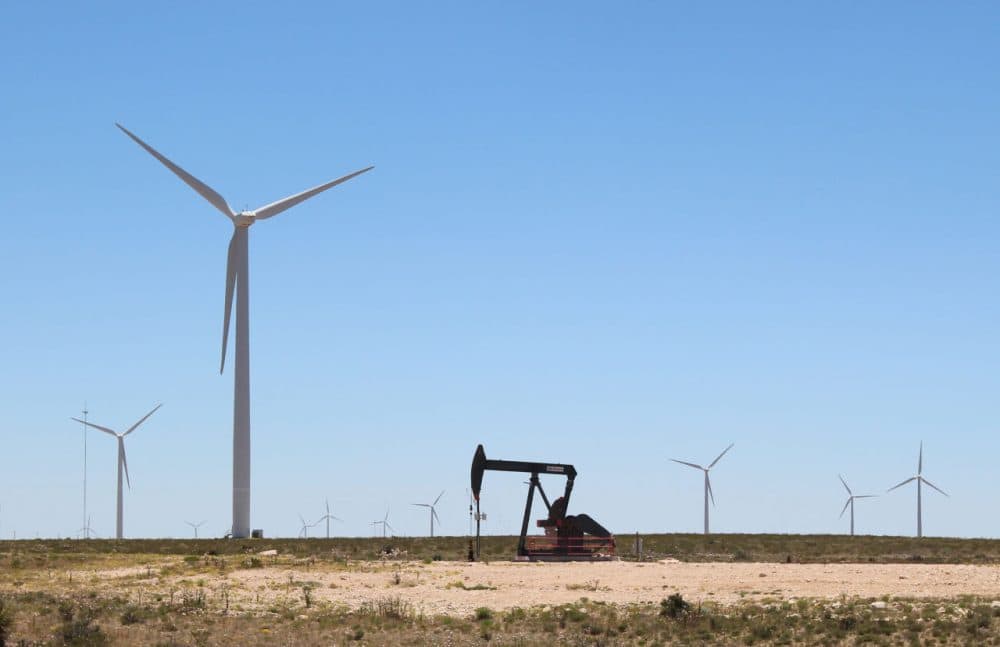Advertisement
How A Booming U.S. Energy Supply Is Tipping Global Politics
Resume
Meghan O'Sullivan, professor at Harvard University's Kennedy School and former special assistant to President George W. Bush, says what's often overlooked as a major driver of foreign policy, is also its most longstanding and consequential: energy.
Working in government and in energy, she says she saw very little intersection between the two worlds. And she writes in her new book that despite energy's huge impact on international affairs, its effect on politics has "never been less understood."
Guest
Meghan L. O'Sullivan, Jeane Kirkpatrick Professor of the Practice of International Affairs and Director of the Geopolitics of Energy Project at Harvard University's Kennedy School and author of "Windfall: How the New Energy Abundance Upends Global Politics and Strengthens America's Power." She tweets @osullivanmeghan.
Interview Highlights
On why there's little overlap between the spheres of government and energy
"The idea of energy independence is something that is very politically attractive in terms of rhetoric, but in terms of understanding what that actually means, what policies would be required to attain that, and even the big question of whether that would be desirable — and I argue in my book that's actually not even something that we should be coveting — I think there's not enough understanding of how energy markets work.
I often think about it in terms of, as humans we can only understand or incorporate so many explanatory variables when we're trying to look at any particular phenomenon. So we weight the things that we understand and we discount things that we don't understand. And in the foreign policy world, technical markets are not something that get a lot of weight."
On the boom in the U.S. energy supply and the effect on our global power production
"Over the last 10 years, we had what is really an unexpected boom in the production of oil, natural gas, and we understand that has delivered economic benefits. But what I really focus on in my book is how that has delivered strategic benefits — because it's changed the environment in which the United States operates and it's affected our friends and our adversaries because, not just the price of energy is lower, but also these markets work differently."
On the relationship between the U.S. and Russia via oil and gas
"Most Americans when they think OK, we have this oil and gas boom — and actually the U.S. has become an exporter of natural gas and of oil, just in the last couple of years — and so people think well, that must mean that we can muscle Russia out of Europe; Our exports can displace their exports. And so everybody looks for this kind of foreign policy cudgel.
But in fact, the impact is more subtle but pretty significant ... Where the difference is, is that our exporting of this commodity and the fact that we're no longer importing from other parts of the world, means that Russia has to deal with an environment where there is a lot more competition. [Russia's] European markets for natural gas in particular, are really important to them, and Russians have used that leverage for political purposes — think about Ukraine, we can also point to other examples. It's harder for them to do that in a world where there's a lot more options for Europe to to meet their energy needs."
How the U.S. should leverage its energy boom
"When I was in government — and many people before me — the whole idea was, our energy situation made us vulnerable — it was a vulnerability. And now, the Trump Administration is the first administration to come in, in many many decades that can say, energy is actually an asset. And so the question is OK, if that's true — and I believe it's true — what should we be doing to maximize this moment?
The administration I think is overly focused just on production — trying to figure out this concept of energy dominance, which seems to mean produce more oil and gas. And I say sure, that might be part of it, but it needs to be a much bigger conversation."
On having the former CEO of Exxon as current Secretary of State
"You'd think [Secretary of State] Rex Tillerson would be the embodiment of this -- a person who gets the global environment, but also understands energy. But thus far, I don't think we've seen him bring the weight of that to bear on our foreign policy.
There could be a lot of reasons for that. My own theory is maybe he and other people from the corporate world, kind of underestimate the complexity of foreign policy making. It looks -- and I can speak as somebody who went in and went out — it looks a lot easier from the outside than when you actually get in there and have to deal with all the constituencies, everything that's already in place, the different actors, the different interests. It's pretty complicated. It's as complicated as energy markets."
On the U.S.'s relationship with Venezuela
"We actually are one of Venezuela's largest export markets. So the Venezuela story right now, of the tragedy that's unfolding there, is related to this boom that I'm talking about — in the sense that the low oil prices of the last several years in combination with economic mismanagement, have really invited the humanitarian and financial crisis that the country is going through.
And then there are all kinds of options for the United States and other countries to put more pressure on Venezuela, by either deciding we're going to stop importing their oil, we're going to stop exporting refined petroleum products to them, or we're going to tell them you can't use dollars to actually facilitate your oil trade.
Now my argument is — some people say the fact that we haven't done that suggests there is some kind of conspiracy theory, that the U.S. really wants to keep Venezuelan President [Nicolás] Maduro in power — my argument is a little bit different. We have those tools, we could bring that force to bear, but it may not be in our interest unless we have a good follow-on plan to the collapse of the Venezuelan regime.
You mentioned I worked on Iraq and Afghanistan. If we learned anything, we learned you can't just collapse the government and hope that good things come in the aftermath. You have to have a plan. And I don't see any evidence yet that we have a comprehensive plan that will help the Venezuelans deliver a better future after Maduro. So I think we have to look beyond just using energy sanctions, even though that could be part of the equation."
On if energy and oil was part of the push behind the United States ousting Saddam Hussein in Iraq
"I do fully admit there's lots of linkages between Iraq and oil, and our strategy, and all of that.
One thing — and I write about this in the book — is that the perception that we went to war over oil, which is common not just in the United States, but in Iraq and in the region — doesn't really stand up under scrutiny. Because if you think about it, there were many ways that the United States could have gotten access to Iraqi oil, well short of sending hundreds of thousands of troops and waging a war with all the risks involved.
At the time of the invasion, which was 2003, Saddam was cutting deals with France, with Russia, with anyone he could, that basically promised sweetheart deals on oil if a country would just agree to lift the sanctions that were in place against Saddam. So if that had been our objective, all we had to do was say OK, we'll lift the sanctions. But in turn, we want you know we want Exxon in there, we want Chevron, we want some kind of special deal. I mean, there's lots of ways in which, if oil was our objective, there's a much easier way of getting control of it ...
I lived in Iraq for two years in total and I spent a lot of time talking with Iraqis about energy, but it was mostly in the context of trying to protect it, because it was the lifeline of their government. And the insurgency that we were battling — the Iraqis and the U.S. and other coalition partners — knew that if they could take down oil infrastructure that this would really hamper the viability of the government. So energy was something we thought about every day, but not in the sense of justifying why we were there."
On clean energy and renewables
As the book does make clear it is largely about oil natural gas because it's about geopolitics and right now virtually all of the international trade and energy is in fossil fuels. But I do acknowledge that renewables are really having a big, disruptive presence in the power sector and I think that's going to continue, and with that big change in the energy mix, will come changes in politics.
... I make the argument in the book that actually our backing away from Paris and the climate agreement is not in our interest for lots of reasons — for the soft power that we lost, but also even if you're just narrowly focused on production of oil and gas the fortunes of our natural gas exports are tied to whether or not big countries like China and India decide to move away from coal.
... My big frame is basically saying hey, when there's a big change in the world of energy, we should expect a big change in the world of politics. And we are going to be experiencing a new transition away from fossil fuels to more sustainable energy and that will upend politics all over again."
On the fact that U.S. policymakers may not have a good understanding of the relationship between changes in geopolitics and global energy supplies
"There are people who see this intersection ... But if you think about it, if you ask most foreign policy practitioners, what is going to shape the global politics in the next 5 or 10 years? They're going to talk to you about Iran, they're going to talk about North Korea, they're going to talk to you about ISIS. They may not be cognizant of the fact that energy underpins all three of those issues and that what's happening in this country is having a huge impact on all of those issues."
This segment aired on September 26, 2017.

